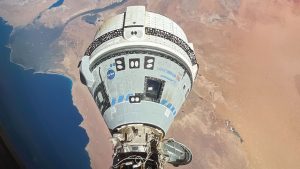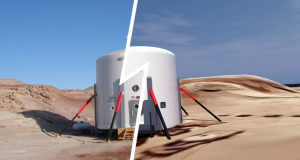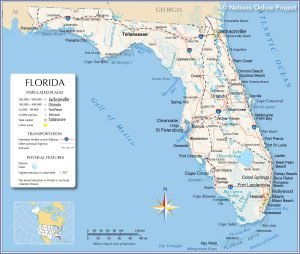Doug Turnbull, Owner of the Mars Pirate Radio Podcast

Doug Turnbull is a science fiction author and owner of the podcast Mars Pirate Radio. You can find his podcast and books on Doug Turnbull’s official website. I caught up with him for an interview late last year after he had given a presentation for the annual Mars Society conference.
HH: Hi, we are here today with Doug Turnbull today. How you doing, Doug?
Doug Turnbull: I’m going just fine, how are you doing?
HH: Good, so congrats on doing a presentation at the Mars Society Conference.
Doug Turnbull: Well thank you very much; it was a lot of fun. It’s a first conference I’ve been to and I was expecting because a friend of mine did a presentation a couple of years ago and she only had, so I was expecting six or eight people at the presentation and instead the room was packed. It was standing room only. There must have been fifty or sixty people there, so it was really, it was really quite exciting and then I got to meet several of the Mars One candidates who were also in attendance and quite a few people, several people like Casey Dryer and Art Harmon, people that I have interviewed on MPR, I had never actually physically met them so that was kind of nice.
HH: So MPR, that is your podcast, Mars Pirate Radio, right?
Doug Turnbull: Exactly, Mars Pirate Radio. I also set up a vendor table [at the Mars Society conference] and gave away a bunch of what would you call review copy, they still got a few typos and things in them of my newest book and then I sold a few of my older books as well, so it was a fun trip, kind of a long one but it was fun.
HH: Awesome, so for your presentation, how did you decide on that topic of food for Mars explores and settlers?
Doug Turnbull: Well that’s kind of almost by accident, over the years as I’ve interviewed people and study Mars exploration and various proposals for Mars exploration, since most of my science fiction stories involve that, the subject of food doesn’t seem to be really high on anybody’s list of what’s important. Well it’s really important if you don’t have it and I also figured, well sure we can ship it all from Earth just like we do to the ISS but that’s not only expensive, but that kind of food which is would have to be probably freeze dried, kind of a modern version of a TV dinner would get old after a while, just think if you’re going to live your entire life eating nothing but that kind of food, it would get pretty boring. So it occurred to me that they’re going to have to grow some food in place and that’s what I postulated in my books, like The Man Who Conquered Mars and so forth, they always had a greenhouse where they grew vegetables and things like that.
So the upshot of the article is that, what are some of the various options that are available so that they can actually prepare their own food, grow it in prepare it there on Mars? Because they’re going to have a long-term exploratory mission or a permanent settlement, you’re just really going to want do it do it that way. That steps how I got it figure and I did notice that while Mars One kind of alludes to it, it never got really specific about exactly how they planned on growing their food. So I made some proposals in this presentation as to various techniques it could be used.
HH: Okay, as far as the greenhouse goes, what options for producing the food that you think would work best?
Doug Turnbull: Well, there are several and I touched on it in the presentation. First of all it won’t be a traditional greenhouse in that right now we don’t really have the physical capability of building one that would be airtight. It would be the most likely to be a garden, that’s in the habitat itself and lit by LED type lighting for the plants and so there are several possibilities. One of them is hydroponics, which is a very efficient way of growing vegetables and things like that because they, you only use the nutrients and fertilizer and water that the plants are actually using and since you’re recycling, if you’re going to set up like the ISS has then you’re recycling 90% of your water then the, really that doesn’t require a lot of extra water to have that type of garden and you can produce things, were a example there is a hydroponic farm in Japan, that they’ve built in an old Sony plant that covers about one acre, about the size of a football field, and because they use stacking they stack these little gardens together and they’re almost like pallets in a warehouse and they’re lit with LED lighting, which is much more efficient then more traditional type lighting. They actually produce ten thousand heads of lettuce a day.
HH: Wow.
Doug Turnbull: That’s on one acre. Which gives you an idea of the how hydroponics increases the efficiency of the vegetable produce in so forth. Now if you take hydroponics and you team it up with aqua culture you end up with what’s called aquaponics and that’s where you have fish or aquatic life that produces phosphates, nitrogen and so forth in their waste and you use that water to irrigate your crop. So that the whole system sort of recycles itself, the crop itself is being grown in kind of a gravel like medium, which will be will be no shortage of that on Mars and the water that comes off of the plants after they’re done with it has been purified because those waste products have been filtered out because the plants use them to make them to grow, the vegetables so that water is then recirculate right back into the fish tank and the whole system is kind of semi-closed. There’s not much you have to do, the imports are fairly modest because most of the output, a good portion of for example the vegetable matter, you can grow certain vegetables specifically at speed for the fish and so then you’ll also be able to harvest the fish occasionally and in other aquatic life and I know a couple of people that are doing this kind of as a hobby and they’ve been quite successful at it because they’ve discovered all of the pitfalls, made all the mistakes and now they have working systems and it’s been actually been done commercially in California, there’s one in Santa Cruz, there’s one in the Napa Valley, that are selling vegetables in the local green grocers and they’re really, it’s very practical way of doing things.
In fact there’s a company here in Kentucky, his name escapes me right at the moment that is in the process of manufacturing a small farm that can be used in eastern Kentucky to grow basically catfish and vegetables for the local markets there because regular agriculture is impossible in eastern Kentucky, it’s very hilly. You’re either going up or you’re going down and the only flat spots are in the bottom land which are subject to flooding, so you know there really isn’t any significant agriculture above the garden size level in that part of the country and this would allow vegetables that they’re now say importing from California to grown right there. There’s some tremendous advantages to it and that type of technology, the good news about it is it both hydroponics and aquaponics are existing technology. You don’t really have to invent anything new to take it to Mars with you. You just have to modify the technology that you already have to apply it to the new situation and that’s the essence of my whole thinking when it comes to the, how we’re going to settle on Mars in the near future. The only way to do it is to make all of your plans based on technology as it exists today. So things that are tried and true that we know will work and that’s the stuff we ought to take with this and you know as time goes on other things will be developed but for now I would stick with things like this, like hydroponics and aquaponics where there is a body of knowledge and experience already out there on how to do it, does that answer your question?
HH: Well that was very detailed.
Doug Turnbull: There are some other alternatives that I discussed that are a little different and there are kind of nascent technologies right now, one of them is generating meat artificially, they grow it in a growth medium and they basically they like a pig or a cow that instead of killing them all you do is they donate a few stem cells and you use that to start growing and you grow, it’s really interesting because the guy was growing essentially growing a pork chop and this is being done in Holland and using stem cells as this as the starting point. Now that that’s pretty interesting, and then also another source of vegetable matter that is fairly low maintenance are fungi and mushrooms, you know that type of thing and they could grow on almost anything, they’ll grow on your garbage, they don’t require to be kept at a constant temperature because right now they grow in caves and old mines where it’s cool and they grow in the dark so it’s a fairly low energy, low maintenance supplement to your diet and the other possibility that I discussed in the talk was insects using them as a source of animal protein and because they’re so very efficient in converting cellulose and plant material into protein. For example a grasshopper can take ten grams of vegetable matter and convert it into nine grams of animal protein. A cow on the other hand takes ten grams of vegetable matter to produce one gram of protein. Obviously the bugs are a lot more efficient. They’re not very appetizing to the western mind but there are countries where they’re considered a delicacy, grasshoppers.
HH: I have about one thousand one ways to make grasshoppers edible.
Doug Turnbull: And the good thing about them is that they’ll eat almost anything, which means that if you know I mean I didn’t make this point that if you’re going to have them, you have to make sure that their farm, there grazing land is kept separate from the garden because you don’t want them to get into your garden because they will eat it and so what you have to do is find out what is the most efficient feed for the grasshoppers or whichever bug you’re going to use as your protein source and grow that and you’ll grow it as kind of a grazing land for the animals. Then let’s see, do I have something else? I’m trying to think it seems to me there was. We did artificial meat.
HH: 3D printers?
Doug Turnbull: Oh yes, there’s a 3D printing, I’ve forgotten about that and that’s again that’s kind of that’s a complex idea but it, and as one of the 3D printer experts that was there, it’s always good to meet these people because they know so much more than I do and he pointed out I said, you still have to have the same ingredients if you’re going to 3D print hamburger you’re going to have to have the same basic ingredients as what goes in a hamburger, in order to get a hamburger coming out the other side. It doesn’t miraculously turn sawdust into ham. So but that’s a possibility of customized, creating customized food using maybe some basic materials and so it maybe it’s a way of taking a grasshopper, you know you grind it up and put it in a 3D printer and it ends up producing a steak for you, could be, I don’t know. That’s a possibility but anyway that’s still, it’s being experimented with and they’ve actually produced some hamburger using that technique but I haven’t seen any marketed as yet and that will tell the tale but I do think and this is an important point.
This type of farming and meat production and this type of technology is going to emerge in this century because more and more people are becoming disgusted with the industrial model of what passes for animal husbandry these days. You know the way cows are treated, hogs and chickens are treated is just appalling and it could make you feel guilty having your pork chop. If there was a way to do this just by them donating some stem cells that would be really cool then I mean you’d have a few of them there and that would be the end of it. Of course the people within that business currently wouldn’t be too happy about it but I expect they’ll always be an upscale market for the “real thing” but generating artificial meat might be a good alternative to that.
The current method which is very inefficient and similarly the hydroponic gardens there’s one in New York, Gotham Green, it’s called which has a huge greenhouse in Brooklyn and you know they’ve used one of those, I forget what they call them I think they call them green zones or something anyway it’s a place where an old factory was and nobody wants it so they build a greenhouse there and they grow vegetables for a local distribution but of course one of the advantages to that is that number one, you can sell a vegetables of being fresh, just harvested today, it didn’t get any fresher and number two, there’s very little transportation cost and you’re not shipping it clear across the country. You’re not shipping it from the Imperial Valley to Brooklyn. You’re already in Brooklyn and if you’re going to ship from the Imperial Valley, you’re going to have to pick the tomato when it’s semi-green. Otherwise it will be rotten by the time it makes it to Brooklyn.
So, it’s got to ripen off the vine which takes away an awful lot of the flavor, it’s why those little round jobs that you’re buying the grocery store now don’t taste very good, it’s because of that they’re all picked at the same time, they’re picked mechanically and they’re generally picked when they’re still hard enough that they can stand handling and shipping and that’s just, this does away with all of that and so you know and it also makes use of land that otherwise isn’t being used in the city.
So I’m kind of talking your leg off on the food thing but as I got into answer your first question as I got into this, I’m sort of exploring the possibilities this is the things that I’ve discovered over the years and so I just kind of figured well that this is some I actually know a little bit about it and so that’s where I’ll talk because most of the people at that convention were I mean, they were plasma physicists and rocket scientists and people like that well heck, I’m just a science fiction writer who has done a little bit of research on this subject so I’m not an expert in anything but I can quote a few experts.
HH: So, what do you expect out of Mars exploration going forward from here?
Doug Turnbull: Well I’m hopeful fo Mars One or some version of Mars One. I don’t know whether the existing structure of the foundation will end up being the final one. It depends on how well the managers manage things and to be honest to my mind they haven’t done a very good job to date. They haven’t been utilizing what I consider their strongest resources, which are the volunteers itself, so yes, because they’re the most driven and they’re all capable knowledgeable people. Every one of them that I’ve talked has been somebody I would not mind taking with me if I were going to Mars and so I don’t think they’re fully utilizing that resource but I do think that some version of Mars One, the one way trip is going to be the preferred method of going to Mars.
Now whether they’ll be an exploratory mission that goes to Mars and lands and then returns, I don’t know. I am doubtful that model is a good one because for one thing, if you have an expedition that is mostly scientists, that’s what it is, a scientific mission but you’re not going to get any of them to leave once they’re there. Why would they come back here?
They are the world’s most prominent geologists and chemists and atmospheric scientists in the whole world because they are the only ones on Mars. I doubt very much that you can pry them out of there once they’re there, so it’s not really a hard sell. The one way trip isn’t really a hard sell at all. They probably should have some sort of return vessel for something. Some may choose to return, but I just don’t see why the whole mission has to come back.
I mean, if you’re going to have a scientific station on Mars, just leave your scientists there. They’ll still have access to the Internet. It won’t be the kind that we have because they’ll be back to emails because of the time delay factor, but even so our ability to communicate now is very good as the control of Pathfinder and Opportunity and Curiosity has proven.
So that’s how I see it. There’s a couple of possibilities that I do think that would eventually go to emerge because purely because of the economics that will be a factor, simply because that’s where you’re going to get the money, it cost less, there’s less risk involved in terms of everything. You know rockets are like airliners, 99% of the crashes that occur in commercial air travel happen during takeoff or landing. When it’s mid-flight, it’s not dangerous at all so the more times that you do takeoffs and landings the more danger you in and the same goes with the spacecraft. The real, the most dangerous times are during atmospheric braking and during takeoff. They’re in launch ascent when the rockets are fired and in between time there’s nothing to it. It’s just coasting along and so the return to the one way mission has the advantage of having only one launch and one line and that’s it. So the the amount of risk is at least half, the amount of risk of loss of the mission is at least half doing it one way than it is doing a two way mission. So, there are some real positives to doing the one-way model.
HH: With Mars Pirate Radio, what kind of guests do you have coming up?
Doug Turnbull: Well let’s see Dr Zubrin has agreed to come on the show again, I had him a couple of years ago and of course I had you on the show a couple of years ago also.
HH: I remember that.
Doug Turnbull: You were one of my first guest from the Mars One candidates and so I’ve got Ryan McDonald has agreed to an interview but he’s pretty busy right now he just started his PhD program, at I think it’s Cambridge or Oxford or one of those places and so I’m just out to catch up with him and but he’s already agreed to it, he’s reviewed his questions and so forth and Lucinda Offer from the Mars Society who is the executive officer. She kind of does the managing part of the Mars Society.
Dr. Zubrin is the president and one of the founding members and she did a really interesting presentation on women on a Mars mission and how that they fit into the program. It’s very interesting. So we’ll we get a chance to talk about that. Let me see what else is on my list. I should’ve been ready for it but up anyway I have a few guests lined up and I’m not really looking forward to the interviews because everybody always seems to be very interesting and they always know more than I do which is not too hard but it’s good, that’s why I have guests because I can’t know everything and I will run out of ideas after awhile, so I have heard quite a few good things from quite a few people about their thoughts on how these sorts of things ought to come down trying to think I had a couple of other people I was talking to also.
Oh, C. Carlson who is the co-author of a book called, In the Shadow of Eris, that was written a couple of years ago, several years ago and I reviewed it and he’s agreed to come on because he and his partner are writing a new book, a new Mars book [that became We Are The Martians], so he’s already agreed and so forth, I just we haven’t nailed down exactly that the time and so forth. So those are some of the upcoming guests and I’m open to get more, I have sent out feelers through a lot of other people and I’m hoping to get some more guests because they’re always interesting in the always come away knowing more than you did when you started.
HH: And you mentioned you’re a science fiction writer too?
Doug Turnbull: Oh yes, I have several novels and in a newly released novel, my best is The Man Who Conquered Mars, it was the first one I wrote, it the basic formula for it is that it is the one that it takes place in the 2050’s, so there’s an established Mars colony but it was put in place using the one way technique, which I you know I’m not going to accuse Lansdorp of stealing the idea because it’s not a new idea but I do think it’s kind of neat that the formula that I postulated in the book is now coming into some acceptance at first you remember just a couple of years ago, everybody dismissed it as ridiculous. Well they’re not anymore and I mean even Dr. Zubrin won’t dismiss the idea.
Back when I did the first interview with him and now he’s on the advisory board of Mars One so a lot of people come on board and the question now is making it work, not whether it’s feasible or sensible to do with that way. It’s how we’re going to make it work and how we’re going to raise the money that’s sort of thing.
I envision whatever, I envision there being a lot of sponsors, lots of you have to actively go out and get them, and they’ll be people who just like your NASCAR drivers that have patches all over them, you know in their cars are covered with signs from Pennzoil and everybody else that is part of their sponsorship, Good Year and so forth, whoever makes something for the Mars One mission is going to want the publicity of that because they can use that and it advertise you know.
If you’re making the food, if you’re making a special dinners for the Mars astronauts you’re going to be able to market those here based on this is astronaut food, you’re not old enough to remember the Tang, which was is the instant drink, was originally developed for the space program and they use marketing to the hilt as advertising plow back when it was first released commercially and so there will be those kind of sponsors, there also be like last or who originally planned the TV rights and reality TV type thing.
The revenues there are going to be limited, there’ll be money, and it will also help boost the whole idea that this is a real deal and it’s worthy of your attention and investment and then the final one which to me is the biggest one, you’re going to have some scientists, you’re going to have some universities and other foundations that are going to say, wow this outfit is really going to go to Mars here in three or four years and they are going to want to get on board, so you will do there are experiments for them and they’ll give you money to do that.
Some of these universities are very well endowed, they can afford to invest in this so these are all private sources of money that can be used and the key to making it work is Mars One or whoever does this is going to have to establish itself as legitimate, as the real deal. We are really doing this and then once people believe that, they’ll get behind, they’ll invest it and the analogy I use is that in the early days of the when they were going to build the Transcontinental Railroad, the founders of Union Pacific and the founders of Southern Pacific, which Southern Pacific from the west, Union Pacific from the east had trouble selling this idea. Oh this is fantastic, you’ve got all these mountains and deserts and everything, can’t be done, can’t be done.
Eventually they were able to dispel those doubts and get investors even though the guy that ran Union Pacific actually looks like he sold about twice as many shares as there actually existed, he was kind of a fraudster but they ended up building the railroad and that’s the key and here it’s the same thing. You have to convince people that it can be done because it first it sounds impossible but when you examine it carefully, realize that it isn’t impossible and it’s quite feasible and so when they do that you’re going to have to have something to market and one of the, there will be sponsorships and things like that, they’ll be some prestige to market but this brings up another subject which is going to be touchy for a lot of people.
I think you’re going to be selling Mars real estate because I mean, you’re there, and you’ve got the first claim on it. Just like going west, same thing, you’re there, you stake your claim and somebody says, well I want the mining rights here and we’re you know in the certain section where they know there probably is some materials that are worth mining and they’re willing to invest in that because they know that whatever they pay for it today, is going to seem like a bargain, ten, twenty, or thirty years from now when Mars colony grows and becomes an economic force of its own and that and that’s the essential part about it. Right now people think well, what are they going to do on Mars that they can bring back here? Well probably not a whole lot other than intellectual property that type of knowledge but it was the same thing when we settled North America. How much is North America worth now and would you have invested it in you know four hundred years ago? Well a few pennies four hundred years ago would have turned into an awful lot now, would have to pay the Indians eleven dollars for Manhattan, pretty good investment, when do you think about that?
Whatever you may think of the rip off that it was, that’s the kind of investment that would be selling and because we’ve been you’re going to need some cash and those kind of investments and also the legitimacy will get the other space agencies on board as well, they’re going to want to be in on this, company’s like Space X, you know it’s going to be a big feather in their cap if they’re the ones that are supplying them with the lift rockers, you know those caused those same thing, whoever is whoever is doing this is going to in kind contribution they can make to give you a real discount in return for the fact that they can claim that they’re the ones, they did this, Lockheed Martin didn’t do this, we did this, you know and that’s a big selling point, if there is one, because space, particularly space in low Earth orbit, and possibly to the moon, is going to be it’s going to start getting busy over the years and companies, you know, like the one like Elon Musk has are, that’s what they’re looking at because Elon is not running a charity, he is doing that because intends to make money and he knows that the way to make money is not just selling rocket delivery to NASA, the way to make money is to do it commercially and sell a product to somebody who’s willing to pay for it, that’s how I see it, but did I answer your question or did I wander off?
HH: Slight wander off but that’s all right. That’s about all I got, thanks for joining me.
Doug Turnbull: Well thank you for having me on and I appreciate it and I’ll do it anytime you are interested, how long did we talk?
HH: Close to half an hour, I think.
Doug Turnbull: I see, okay. Well everybody’s probably tired of hearing me talk anyways so.
HH: It was interesting.
Doug Turnbull: Well thank you so much and I think I see you have a better camera than you used to have. Everything seems to be working better.
HH: Yeah I think I’ve got a better light source mostly.
Doug Turnbull: Well I’m glad you could hear me this time, when we tried it the first time I have no idea what was not working but I’m using the same camera and microphone, but anyway let me know when you’ve decided when you got it edited and what not and you decide to post it, do you edit these before hand?
HH: I think I edited like one video that got messed up but usually they are all right.
Doug Turnbull: Okay, well I’ll let you go then and I appreciate it, I appreciate the opportunity to do a promo of Mars Private Radio.
HH: Thank you.
Doug Turnbull’s Mars Society Presentation
Books by Doug Turnbull
Aquaponics and Hydroponics on eBay
[ebayfeedsforwordpress feed=”http://rest.ebay.com/epn/v1/find/item.rss?keyword=%28hydroponics%2Caquaponics%2Cindoor+gardening%2Cgreenhouses%29&sortOrder=BestMatch&programid=1&campaignid=5337337555&toolid=10039&listingType1=All&lgeo=1&topRatedSeller=true&feedType=rss” items=”15″]










